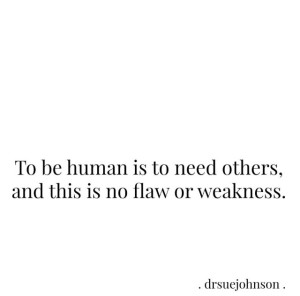This is How Positive Change Happens…
You’re needy. We’re all needy. We’re born with needs, we live with them, and we die with them. There’s no choice in this. It’s a given of our human existence, whether we like it or not. It’s really the same as breathing. It would seem really strange to criticize ourselves or each other for breathing, right? Yet when it comes to needs, that’s sometimes what we do. We criticize, judge, minimize, or downright deny, that we have needs and other people do too. This gets us nowhere. It causes a lot of pain and suffering, including communication breakdown, along the way.
The fact that we have a whole range of needs makes us human and, it makes us vulnerable. Dependent, in fact. Some of us really don’t like that. Some of us have been taught that it’s really important to be “independent”. We’ve coped with our important needs not getting met by parents in childhood by becoming really independent and telling ourselves, “I don’t need you anyways”. Yet, having needs, and being impacted by whether those needs are being met enough or not, is just the way life is. I’ve noticed, on a personal level and in my counselling work with clients, the more we accept our needs, the better life gets. Bad things don’t happen when we accept our needs. Quite the opposite proves to be true, especially in couples relationships.
The Trap
One of the reasons this is true is because there’s a direct link between how we feel (or our emotional state) and whether or not we’re experiencing our needs being fulfilled enough or not. If you want to communicate better with your partner or resolve conflict better, you need to link your feelings with your needs.
Here’s an example:
Imagine a couple having dinner together at a restaurant. Better yet, let’s imagine it’s Date Night. Initially, they’re talking to each other about how their days went, they’re making eye contact and nodding, they sometimes reach across to each other and hold hands and smile. Date Night is going well. Then, one person starts to look at their phone because they just received a text from a friend/family member/work colleague. They mention this to their partner. But then, they decide to reply to the text and get into an involved texting conversation (this is about a non-emergency issue). I’ve heard this new social behaviour is called “phubbing”. Soon enough, the other partner, gets angry and anxious, and either tries to cope with it by throwing out a defense such as a critical jab like “Oh there you go again, always on your phone” or by shutting down and doling out the silent treatment. This escalates between them and they spend the rest of Date Night in a fight.
Sad, isn’t it? So, what’s really going on?
From an Emotionally Focused Therapy for Couples (EFT) approach as well as a Nonviolent Communication (NVC) approach, an observable behaviour or stimulus has occurred which became a trigger. Getting triggered is not the problem and it’s valid to get triggered. The triggering interaction gave rise to a cascade of physical sensations/anxiety and emotions like anger and sadness. Coping with this is difficult and that’s often where our biggest challenge lies. Ineffective coping behaviours or defenses like lashing out and making critical jabs or, withdrawing and shutting down, kick in immediately. This escalates an already painful interaction between the couple. They get caught in what I call “The Trap”.
How to Get Out of The Trap
Acknowledging unmet needs is vital to get out of The Trap. The painful emotions and physical sensations/anxiety are there because an important need was no longer getting met when their partner got too involved with their phone during Date Night. That unmet need could be one or more of the following:
To feel connected
To feel close
To feel considered
To feel respected
To feel acknowledged
To be empathized with
To feel committed to
The couple will be able to repair this rupture in their connection when they identify and share their feelings, unmet needs, and they directly communicate about it.
Here’s an example of direct communication that would help:
“I was feeling so good and connected with you tonight. When you starting texting with ___________________, I felt anxious and I felt mad at you. My need to feel connected and close with you wasn’t met when you did that. Can you please acknowledge that, apologize, and do your best to stay connected with me during our next Date Night?”
Shared in this deep, honest, safe, and vulnerable way, their partner will be better able to hear the impact of their behaviour, acknowledge it, give empathy, and offer a repair. The couple experienced a rupture but by sharing their true feelings and needs, they can re-connect, bond, and move forward together.
I encourage you to practice being the needy person you already are.
If you need some support along the way, I can help. Contact me for an individual or couples session.


